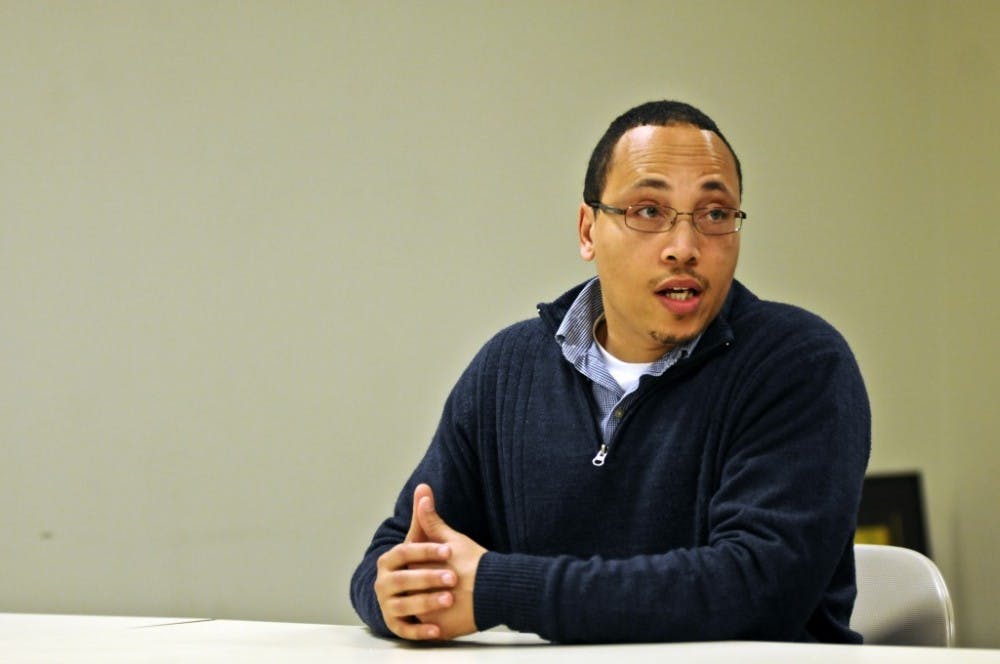Roger Sneed described himself as a very angry undergraduate.
“I kept encountering these sometimes catastrophic collisions with race and religion and sexuality,” he said in regards to multiple life experiences, especially those during his years in college.
Sneed, who teaches religion at Furman University, spoke in Belk Library Feb. 23 about how his homosexuality made him rethink his religious beliefs and values as a black male. His speech and discussion “Intersections: A Conversation about Race, Sexuality, and Religion” were sponsored by SPECTRUM, Elon University’s queer-straight alliance.
Sneed prefaced his talk with his upbringing in Tulsa, Okla. He was the only boy in his family and said certain religious expectations were ingrained in him by his parents.
“I pictured myself as a preacher at age eight,” he said. “By the time I got to college, I had been thoroughly ensconced in what scholars call ‘the black church.’”
Sneed said his identity crisis came during his undergraduate years at Tulsa University, where he assumed a number of respected positions within his campus’ black community. He joined Alpha Phi Alpha fraternity, sang in the gospel choir and became the first vice president, and later president, of the Black Union. These roles were all typically attributed to a heterosexual black student, according to Sneed.
Sneed said he experienced disjointed and unfounded anger during this period of college.
“Man, are you mad at everything?” was a question Sneed said was posed to him by his classmates on more than one occasion.
Sneed said he had a realization that his anger stemmed from the fact that he was gay.
“I couldn’t admit to myself and others that I liked men,” he said. “I came out, and then I went back in the closet.”
Sneed said he initially received a varied response to declaring his sexuality.
Some of his fraternity brothers warned him that coming out would embarrass the organization. Sneed said he thought it was incredulous that he was being treated more harshly than another member who had been making drug deals.
Sneed’s exposure to negative views of homosexuality is a factor he attributes to moving to Atlanta to join a seminary after he completed his undergraduate studies. He said he had some preconceived notions of the city being a utopia for the gay community. But when he arrived, he met black men that shared his sexuality, but were ashamed and regarded it as something that was only supposed to occur in white males. Sneed said he was often stereotyped, especially when he started to pursue his Ph.D. in the field of religion.
“It was a matter of recognizing the paradox of who I am and the positions I have held,” Sneed said.
Sneed engaged in debates with college classmates — even fellow LBGTQ allies — on the subject of religion versus sexuality. The arguments were spawned when he revealed to people, who already knew his sexuality, that he was pursuing studies in religion, he said.
This collision is the basis of his recently published book, “Representations of Homosexuality: Black Liberation Theology and Cultural Criticism.”
Sneed said he wanted to teach because he did not want undergraduates to have the same experience he had.
“To be a professor is not to be a perfect disseminator of knowledge,” Sneed said.
Sneed said he remains optimistic about furthered acceptance and understanding at the intersection of sexuality and religion.
Sophomore Kevin Moore, president of SPECTRUM, said he recognizes the importance of Sneed’s topics.
“I think it’s good that we are having programs like this because there is a divide of religious beliefs in SPECTRUM and on campus,” Moore said.
Kirstin Ringelberg, coordinator of both the art history program and the LGBTQ Office at Elon, said Sneed’s discussion was just one program in SPECTRUM’s lineup of events focused on voting against Amendment One. The upcoming state legislation slated for the May 8 ballot will ban legal recognition for all unmarried couples.


